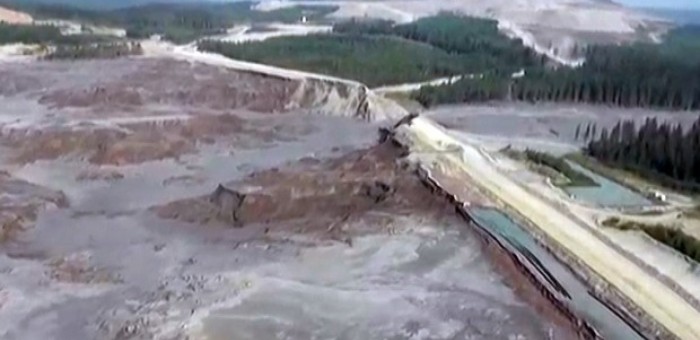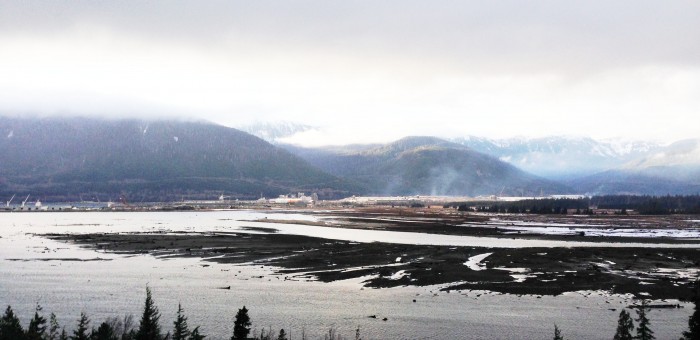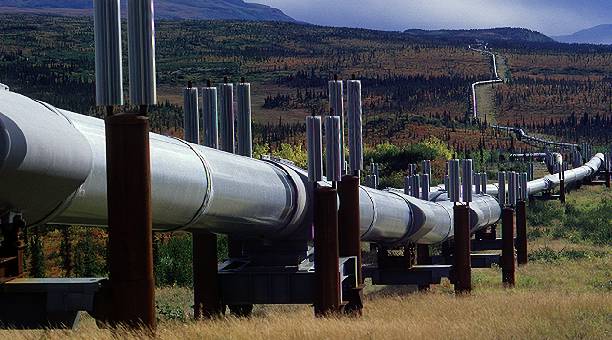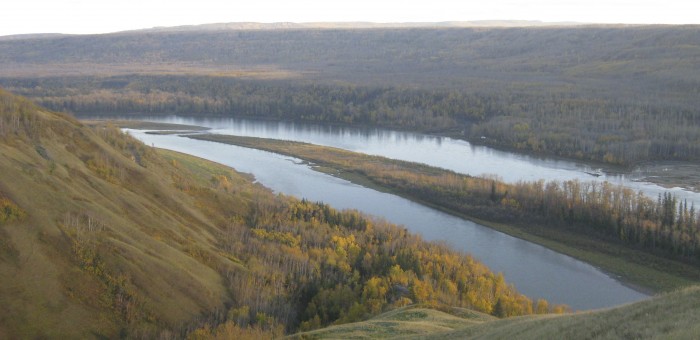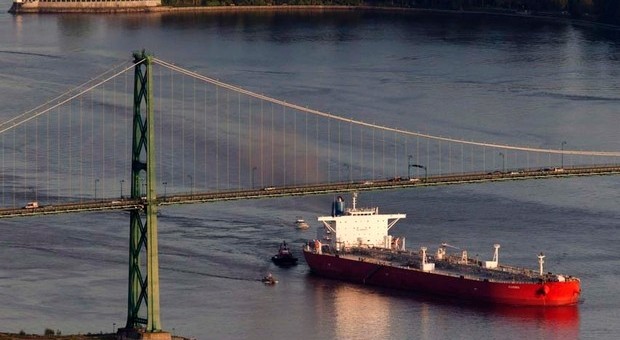Media
Testing and Cleanup is the Priority for Mount Polley Mine Breach
Media Statement: August 6, 2014
Testing and Cleanup is the priority for Mount Polley mine breach
For Immediate Release
Victoria B.C. – The tailings pond breach at the Mount Polley copper and gold mine near Likely B.C. is estimated to have released 10 billion litres of potentially contaminated water, and 4.5 million cubic metres of metals-laden fine sand. All of the mine tailings are an eco – system and financial risk flowing into the creeks, rivers and lakes of the Cariboo region, possibly into the Fraser system, just as salmon return This is an unprecedented situation for the province, with both the company and the government appearing ill-prepared to respond.
Stark warnings to the residents of the region: ‘do not even touch the water’ and now, two days after the breach, a local state of emergency has been declared. The immediate concern is ensuring downstream drinking water is safe for use, Longer term, there are questions on how far the contaminated sediment will spread through the river and lake systems, the potential effects on groundwater and on fisheries and wildlife.
“The problem now is not what we do know, but what we don’t know” said Andrew Weaver. “I have asked the Minister of Environment to consider independent testing of the water and sediment mixture to reassure local residents, and everyone potentially affected downstream, that the information is complete and impartial”
Media Contact
Mat Wright – Press Secretary, Andrew Weaver MLA
mat.wright@leg.bc.ca
1 250 216 3382
New airshed study is a “nail in the coffin” for government LNG dreams in Kitimat
Media Statement: July 18, 2014
New airshed study is a “nail in the coffin” for government LNG dreams in Kitimat
For Immediate Release
The new Kitimat Airshed study clearly shows that it is not possible to put four new LNG plants into the Kitimat airshed without “critical” impacts on human health according to Andrew Weaver, MLA for Oak Bay-Gordon Head and Deputy Leader of the BC Green Party.
“The B.C. Government is not painting a complete picture of the serious ramifications of this study,” says Andrew Weaver. “They are trying to paint what is actually a dire conclusion in good light to avoid undermining their LNG dreams. The study undeniably concludes that if you put four LNG plants into Kitimat you will have critical impacts on human health.”
The Kitimat Airshed Assessment study was commissioned by the B.C. Government to explore the impact that major industrial development would have on the Kitimat airshed. The study first considered the impacts of building four LNG plants and then considered the impacts of adding an oil refinery. It also considered various ways of mitigating toxic emissions.
The study concludes that even under the best case scenario with no oil refinery and with full treatment of Rio Tinto Alcan smelter emissions, four new LNG plants will raise sulphur dioxide levels to the point of causing “critical” risk to human health. Those plants will also increase nitrogen dioxide levels to the point of causing “high” risk to human health.
The study also concluded that the only way to avoid high or critical risk of aquatic ecosystem acidification is for all LNG plants to be powered by electric drives, for there to be no oil refinery and for the Kitimat smelter to implement a “full treatment” of emissions. The B.C. Government has already ruled out the possibility of electric-drive LNG plants, meaning it will be impossible to avoid high or critical levels of aquatic ecosystem acidification if four LNG plants are built.
“This is a nail in the coffin for the Government’s lavish LNG dreams in Kitimat,” says Weaver. “It is a thorough and excellent study and it is clear in its conclusions; the government simply cannot spin its way out of this. If you build those four LNG plants, they will put the people of Kitimat, Terrace and many other communities in the area at a critical risk to their health.”
-30-
Media Contact
Mat Wright – Press Secretary, Andrew Weaver MLA
Mat.Wright@leg.bc.ca
1 250 216 3382
New Timeline for Kinder Morgan Hearings Creates Opportunity for Oral Cross-Examination
Media Statement: July 15, 2014
Weaver says NEB timeline extension creates opportunity for oral cross-examination
For Immediate Release
The National Energy Board’s extended timeline for Kinder Morgan’s Trans Mountain pipeline hearings offers a perfect opportunity to introduce oral cross-examination into the hearing process, according to Andrew Weaver, MLA for Oak Bay-Gordon Head and Deputy Leader of the B.C. Green Party.
The National Energy Board announced today that it has revised its timeline for the pipeline hearings. The new timeline will put the regular hearing process on hold for three months while Trans Mountain files supplementary information on its new pipeline corridor through the City of Burnaby.
“I support the three month extension so that the necessary information on the new route can be tabled and reviewed by the NEB and by intervenors,” says Andrew Weaver, who himself is an intervenor in the hearing process.
This three-month extension would have put the NEB’s final deadline to submit its recommendations to the Federal Cabinet right in the middle of next October’s Federal election. However, the timeline has been further extended by an added four months, pushing the decision until January 2016.
Extending the timeline for the Trans Mountain Hearing Process was debated earlier this year, when Andrew Weaver supported a motion that requested that the NEB include oral cross-examination as part of the Hearing Process.
Oral cross examination was crucial to uncovering gaps in Enbridge’s evidence during the NEB hearings on the Northern Gateway Pipeline. Unfortunately, the NEB rejected the motion on the grounds that they had to meet a legislated timeline for reviewing this project.
“Given that an extension has been granted so that new evidence can be brought forward, I hope the board will reconsider its decision on oral cross-examination,” said Weaver. “There is no replacement for questioning Trans Mountain’s evidence in person, particularly in light of the inadequate written responses that Kinder Morgan has been providing to intervenors.”
“If the Board is willing to extend the timeline so new information can be introduced by Trans Mountain, I would hope they would consider using the extended timeline so that something as essential as oral cross-examination could be introduced to test company’s evidence,” said Weaver.
Andrew Weaver is the only B.C. MLA with intervenor status in the hearings.
-30-
Media Contact
Mat Wright – Press Secretary, Andrew Weaver MLA
1 250 216 3382
Weaver calls on BC Government to broaden BC Hydro scope to allow for production of geothermal power
Media Statement: July 9th, 2014
Weaver calls on BC Government to broaden BC Hydro’s scope to allow for production of geothermal power
For Immediate Release
Vancouver, B.C. – Today, Andrew Weaver, MLA for Oak Bay-Gordon Head and Deputy Leader of the B.C. Green Party, joined Gwen Johansson, the Mayor of Hudson’s Hope, as she released an independent report on the impacts of and the alternatives to the Site C project. Building on the findings of this report, Weaver is calling on the Provincial government to broaden BC Hydro’s scope to allow for the development of a geothermal power capacity in the province of British Columbia.
The Joint Review Panel (JRP) for the Site C dam released their report in early May. They found that the proposed project would result in significant and irreversible community and environmental impacts, and that there has not been sufficient assessment of the effects of rising electricity rates, advancing technology and energy conservation. They further noted that the accuracy of project cost estimates could not be confirmed because they did not have the information, time or resources. The Panel concluded that more work needed to be done and recommended a thorough review by the British Columbia Utilities Commission (BCUC).
The independent report released today by Mayor Johansson builds upon the findings of the JRP and proposes a number of cost effective alternatives to the Site C dam.
“It’s easy to believe that developing alternatives is always something that’s on the horizon,” said Weaver. “But with renewable resources like geothermal, British Columbia is actually falling further and further behind the rest of the world. If you look along the West coast of North America, and indeed throughout the entire Pacific Rim, the only jurisdiction that isn’t using its geothermal resources is British Columbia.”
Geothermal is only one of a number of different options identified in this report that are likely to produce power cheaper than Site C, while meeting the clean energy demands of this Province.
The Site C dam, if built, would be situated on the Peace River. It would produce 1,100 MW of power capacity and up to 5,100 GWh of electricity each year at an estimated cost of $7.9 billion dollars.
The construction of the Site C dam will flood 6,427 acres of Class 1 & 2 agricultural land, which includes the only Class 1 agricultural land north of Quesnel. The affected Treaty 8 Tribal Association has already expressed a number of serious concerns regarding the Site C dam proposal.
The Minister of Energy and Mines has stated that the decision as to whether or not Site C receives environmental certification will come sometime around September.
“The Province should take this opportunity to pause and explore whether geothermal energy could provide the same quantity of stable, reliable power, but in a more fiscally and environmentally prudent fashion and in a way that fosters partnerships with First Nations, while providing greater and more diverse job opportunities across the Province.” said Weaver.
Media Contact
Mat Wright – Press Secretary, Andrew Weaver MLA
mat.wright@leg.bc.ca
1 250 216 3382
Kinder Morgan Responses Unacceptable
Media Statement: July 3rd, 2014
Andrew Weaver: Kinder Morgan Responses Unacceptable
For Immediate Release
Victoria B.C. – Today, Andrew Weaver MLA for Oak Bay-Gordon Head and Deputy Leader of the B.C. Green Party has submitted a motion to the National Energy Board, asking them to compel Trans Mountain to provide full and adequate responses to questions that he submitted as an intervenor in the Trans Mountain Hearing Process. Many of Trans Mountain’s answers to his information requests were “incomplete” and “unacceptable”.
As a part of the National Energy Board hearing process on Kinder Morgan’s proposed Trans Mountain pipeline project, Dr. Weaver submitted nearly 500 questions to the company. Dr. Weaver’s questions focused on the risk and impact of an oil spill, the scientific underpinning of its oceanographic analysis, and on the extent to which people on southern Vancouver Island were consulted. Trans Mountain, a fully own subsidiary of Kinder Morgan Canada, recently submitted its answers to Dr. Weaver’s questions.
“Many of the answers I received are simply unacceptable,” says Andrew Weaver. “They are refusing to consider any oil spill larger than a small fraction of a tankers cargo, and basing their oil spill analysis on a response capacity that simply doesn’t exist. The lack of substantive response shows a disregard for the essential role that intervenors play in the hearing process.”
Collectively over 10,000 questions were submitted to Trans Mountain as a part of the first stage of information requests. With the National Energy Board’s ruling to exclude oral cross-examination from the hearing process, intervenors will only have one more opportunity to submit follow-up questions to the company.
Many intervenors have argued that the decision to exclude oral cross-examination has severely constrained their ability to hold Trans Mountain to account on its evidence. These concerns will ultimately be put to the test in the coming weeks when the Board makes its ruling on the adequacy of Trans Mountain’s answers. Intervenors have until July 4th to submit motions to the NEB requesting a ruling be made.
“Given the massive outpouring of opposition to the Northern gateway pipeline and the serious concerns that have been raised about heavy oil spills, it is hard to believe that Kinder Morgan wouldn’t be doing everything possible to assuage the concerns of intervenors and all British Columbians” said Weaver.
Submission to National Energy Board from Andrew Weaver – download here.
Media Contact
Mat Wright – Press Secretary, Andrew Weaver MLA
mat.wright@leg.bc.ca
1 250 216 3382

